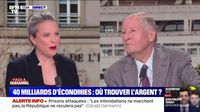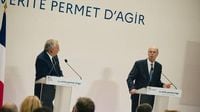On Tuesday, April 15, 2025, a heated debate unfolded on BFMTV's BFM Story, where political commentator Alain Duhamel engaged with Lucie Castets, a candidate for Prime Minister from the NFP party. The focal point of their discussion was a pressing issue: how to locate 40 billion euros in savings amid the current financial turmoil in France.
The backdrop of this debate is a stark assessment of France's public finances, presented recently by Prime Minister François Bayrou. His analysis has not only raised eyebrows but also sparked significant backlash from opposition parties. The dire state of the nation's finances was laid bare, prompting immediate reactions from various political factions.
As the government faces mounting pressure, Bayrou's announcement of potential remedies has been postponed until mid-July 2025, leaving many in the political arena feeling anxious about the future. The delay has been met with skepticism, particularly from the left-wing parties, who are already threatening to bring motions of censure against the government.
During the debate, Lucie Castets did not hold back in her criticism of the current fiscal policies. She condemned the existing tax system as "inefficient," echoing sentiments shared by her colleague Olivier Faure, who earlier called for more "fiscal justice." Faure made headlines on Monday, April 14, by pointing out that the wealth of the 500 richest families in France has doubled in the last seven years—from 600 billion to 1,200 billion euros. He argued that if the government needs to find 40 billion euros, it should look to these wealthy families rather than targeting social services and public expenditures.
"Forty billion euros in savings taken from social services and public services, but nothing from the great fortunes?" Faure questioned, adding that the government’s assurances regarding pension reforms were equally unconvincing. "Don’t count on me to approve this approach," he declared emphatically.
Marine Le Pen, the leader of the National Rally, also weighed in on the situation, expressing her discontent with Bayrou's press conference. She stated, "The Prime Minister's conference is not up to the serious crisis of public finances. We will not allow measures against the French people while there are so many waste and poor management of public finances." Le Pen's comments reflect a broader sentiment among opposition leaders who are increasingly vocal about their concerns regarding government spending and financial accountability.
In the midst of this political storm, Duhamel and Castets's exchange highlighted a critical divide in French politics. While the government appears to be focusing on austerity measures, many opposition figures argue that such policies disproportionately affect the most vulnerable in society. Castets emphasized the need for a more equitable approach to fiscal policy, suggesting that the government should prioritize addressing the wealth gap rather than imposing further austerity on public services.
"If we have 40 billion to find, no one can convince us that it can't be found there!" Castets exclaimed, underscoring her belief that the wealthiest should bear a larger share of the financial burden. This call for a re-evaluation of tax policies resonates with many citizens who feel the strain of rising costs and diminishing public services.
The debate over how to handle France's financial challenges is not just a matter of numbers; it reflects deeper ideological divides about the role of government, social responsibility, and economic equity. As the government prepares to unveil its plans in July, the stakes are higher than ever. The outcome of this debate could significantly shape the future of France's economic landscape and the well-being of its citizens.
In summary, the clash between the government’s austerity measures and the opposition's calls for fiscal justice encapsulates a pivotal moment in French politics. With the looming deadline for financial reforms, all eyes will be on how the government navigates this turbulent landscape and whether it can find a path that balances fiscal responsibility with social equity.





